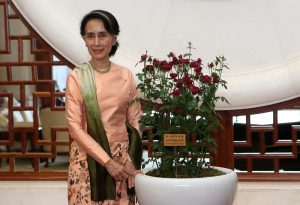Myanmar’s military government has transferred ousted leader Aung San Suu Kyi from a secret location to a prison in the capital Naypyidaw, where her ongoing court cases will be tried at a newly constructed facility. Future hearings “will be conducted at the new Special Court in Naypyidaw Prison,” a source with knowledge of the case told AFP.
Aung San Suu Kyi, who was detained during last February’s coup d’etat, is currently on trial on a raft of charges designed to consign her to an early retirement and tie her up in court proceedings for the remainder of her political life. According to a report by The Irrawaddy, citing sources close to the matter, the politician will be held in solitary confinement in a small isolated building within the prison.
Since trial hearings began last May, Aung San Suu Kyi has been sentenced to 11 years’ imprisonment on charges of illegally importing and possessing walkie-talkies, violating COVID-19 restrictions, sedition and an initial corruption charge. Each of the 11 corruption counts she faces is punishable by up to 15 years in prison.
Aung San Suu Kyi is perhaps the highest profile of the 11,174 people who have been detained for opposing military rule, according to the Assistance Association for Political Prisoners, an advocacy group that is keeping a daily tally of the number of civilians jailed or killed by the junta.
She was also one of the first arrested in the coup, which took place on the morning she and her National League for Democracy were due to be sworn into a second successive term in office. Initially placed under house arrest at her home in Naypyidaw, Aung San Suu Kyi was later was moved to an undisclosed location in the vicinity of the capital, where she has remained even after her convictions. Aung San Suu Kyi’s defense lawyers have been denied contact with the media, and the trial has been held behind closed doors.
On June 19, Aung San Suu Kyi turned 77, and celebrated by sharing a cake that was sent by her lawyers via police, ahead of a court appearance the following day.
According to local media reports, junta authorities have given no explanation for the move, but it is likely concerned about tightening the security around the Nobel laureate, who is the titular head of the National Unity Government (NUG) that has been set up to resist the junta’s rule.
Aung San Suu Kyi’s transfer came as the military junta’s defense minister attended a meeting of Association of Southeast Asian Nations (ASEAN) defense ministers in Phnom Penh, Cambodia.
Gen. Mya Tun Oo attended despite being targeted with sanctions from a number of Western nations for egregious abuses committed by the military since the coup. Last week, 677 civic groups issued an open letter appealing to ASEAN to exclude the minister from its deliberations.
“The Myanmar military junta’s acts fully meet the definition of terror under international and national law, and is responsible for ongoing violations of international human rights and humanitarian law following the military’s illegal coup attempt” the letter read. “General Mya Tun Oo plays a leading role in the management of the military, which is responsible for committing ongoing atrocity crimes with total impunity.”
Since last October’s ASEAN Summit, the Southeast Asian bloc has chosen to exclude the junta’s representative from its high-level meetings, in retaliation for its refusal to implement ASEAN’s Five-Point Consensus plan for resolving Myanmar’s post-coup conflict. (This includes its refusal to grant ASEAN’s special envoys access to Aung San Suu Kyi and other senior leaders.) But such exclusion has not yet been applied to lower-level meetings, especially those involving security officials, where the Myanmar military continues to attend.
Part of this may be a recognition that Myanmar’s military-drafted 2008 Constitution allows defense ministers to be nominated by the military commander-in-chief, and that Mya Tun Oo would have attended these meetings regardless of the coup. But as time goes by, and the military administration continues to stall even on the implementation of ASEAN’s minimalist pace plan, the regional organization may move in the direction of excluding lower-level ministers from its meetings as well.

































